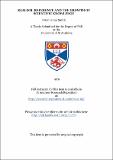Realism, reference and the growth of scientific knowledge
Abstract
In Chapter 1, I discuss the background to the problems which confront a realist account of the growth of scientific knowledge. At the beginning of Chapter 2, I explain in what sense relativism constitutes a challenge to this account. Four interconnected questions are then posed which are said to underlie the realist position. The chapter finishes with an explanation of how some of them arise in an actual case study. Chapter 3 deals with a general argument of Quine's for the view that reference is inscrutable. In reply I maintain that the argument does not hold good, either with respect to interpreting our own language or when it comes to translating an alien language. With Chapter 4, I begin to answer the four questions. I explain how Tarski's theory of truth can be seen as a correspondence theory. It is argued, however, that Tarski's theory itself presupposes theories of reference and extension, and certain recent attempts to overcome this lacuna are criticized. In the next chapter I draw an analogy between natural kind predicates, which are of particular importance in science, and proper names, and offer cluster theories of reference for both. This answers the third most basic of the four questions. These theories are defended against criticisms made by Kripke and Putnam, Chapter 6 aims to answer the second most basic question by considering in detail how we can understand what earlier scientific theories were about. I develop some arguments of Davidson's as a counter to Quine's doctrine of the indeterminacy of translation of sentences. I claim that although translation might in fact be indeterminate, Quine, through concentrating on behavioural evidence to the exclusion of other physical evidence, has failed to show that it is, and that in any case indeterminacy of sentence translation does not imply inscrutability of reference of terms. Finally, in Chapter 7, I sum up ray explication of the realist's account of the growth of science with respect to natural kind predicates. I then consider two cases of theory change of different sorts and suggest how my work might be extended.
Type
Thesis, PhD Doctor of Philosophy
Collections
Items in the St Andrews Research Repository are protected by copyright, with all rights reserved, unless otherwise indicated.

